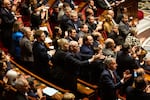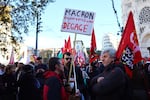
French lawmakers debate in the National Assembly in Paris Wednesday. A majority of legislators voted to oust Prime Minister Michel Barnier, forcing him to resign.
Telmo Pinto
LONDON — French President Emmanuel Macron has vowed to see out his current term until 2027 and name a new government in the next few days, amid a spiraling political criss that has threatened to engulf his leadership.
Speaking Thursday at his official residence in the Elysée Palace in Paris, Macron thanked the outgoing Prime Minister Michel Barnier for his “dedication,” after a majority of National Assembly lawmakers voted to remove Barnier Wednesday, forcing him to resign. Macron accused the opposition parties of choosing “chaos,” saying they “don’t want to build, they want to dismantle.”
The political instability in France — and simultaneously in Germany, where the governing coalition collapsed a month ago — could have wide-ranging consequences for European security, as well as trans-Atlantic relations, analysts tell NPR, just weeks before President-elect Donald Trump enters the White House. With a war still raging on Europe’s doorstep, caretaker governments will now control two of the continent’s most powerful economies.
President Macron had appointed Barnier to head the government only three months ago, after snap elections this summer left no party with a majority in a deeply divided parliament.
On Wednesday, legislators from opposing extreme flanks came together in a vote of no confidence against Barnier, over his proposed 2025 national budget. Now, with the government toppled and no approved budget, Macron knows he must act quickly, according to Mathieu Gallard, a pollster at Ipsos.
“Regarding the adoption of the budget, everything is stalled, nothing can move in the parliament before we have a new government,” says Gallard. “It’s really uncharted territory, since we have never been in this kind of situation.”
The main challenge stems from the fact that none of the political groups in the French parliament have a clear majority, nor do any of them want to negotiate or compromise with one another, Gallard says, while the electoral system means there is very little incentive for that to change, even if Macron calls a fresh national vote in 10 months, which is as soon as the constitution allows after the last election.

A protester against French President Emmanuel Macron holds a placard reading "Macron, you stink, get out," during a rally in Marseille, France, on Thursday, as part of a day of action and strike in the public sector.
Clement Mahoudeau
“Before the election of Emmanuel Macron, we had two blocks opposing in French politics, the left and the right, and it was quite simple.” explains Gallard, who lectures on public opinion at Paris' top political science university, Sciences Po. “Now we have three blocks, a left-wing block, a center-right block and a radical right block, and it makes the situation way more complicated.”
Meanwhile, in neighboring Germany, Chancellor Olaf Scholz lost support from his previous political coalition partners, over economic and budget policies as well. Now he’s limping along to a confidence vote later this month and federal elections in February.
All this adds up to something that European leaders must soon take seriously, says Tanja Börzel, a political science professor at the Freie Universität, or Free University, in Berlin. While she doesn’t believe the European Union “faces an existential threat, yet,” she says, “it’s a major challenge.”
And the timing of these twin political crises is particularly unfortunate, given that polarization and societal distrust of government has been rising on both sides of the Atlantic, Börzel says. “These two countries have always, very often, taken the lead in helping Europe to speak one voice. I think that’s what is required more than ever with Trump taking over the presidency in the U.S.”
At the dawn of a second Trump term in the White House, a chief concern for many in the EU — even before this latest instability — has centered on the continent’s security.
“For the EU today, the No. 1 urgency is the Ukraine war,” says Alexandra de Hoop Scheffer, acting president of the German Marshall Fund of the United States, speaking in a video call during a visit to Washington, D.C. “As we know, [there is] a certain dose of anxiety in terms of how the Trump administration will handle the war in Ukraine with the potential deal that might circumvent Europeans.”
There has been an ongoing debate in many European countries, known colloquially as the “guns versus butter” battle. It has pitted the need for increased defense spending — prompted not only by the Ukraine conflict, but also Trump’s frustrated attitude with member states' NATO obligations — against domestic requirements amid an ongoing cost of living crisis.
And it’s the budget fights in both France and Germany that have recently helped topple their respective leaders.
“At the end of the day, the EU is not united on Ukraine, and it’s always European fragmentations that fuels European weaknesses,” says de Hoop Scheffer, who previously worked for NATO as well as the French Defense Ministry. “The crisis of French-German leadership — that truly doesn’t help,” she says.
And with Europe’s two largest economies already spluttering, the new year may herald a new era for both the European Union and the United States.